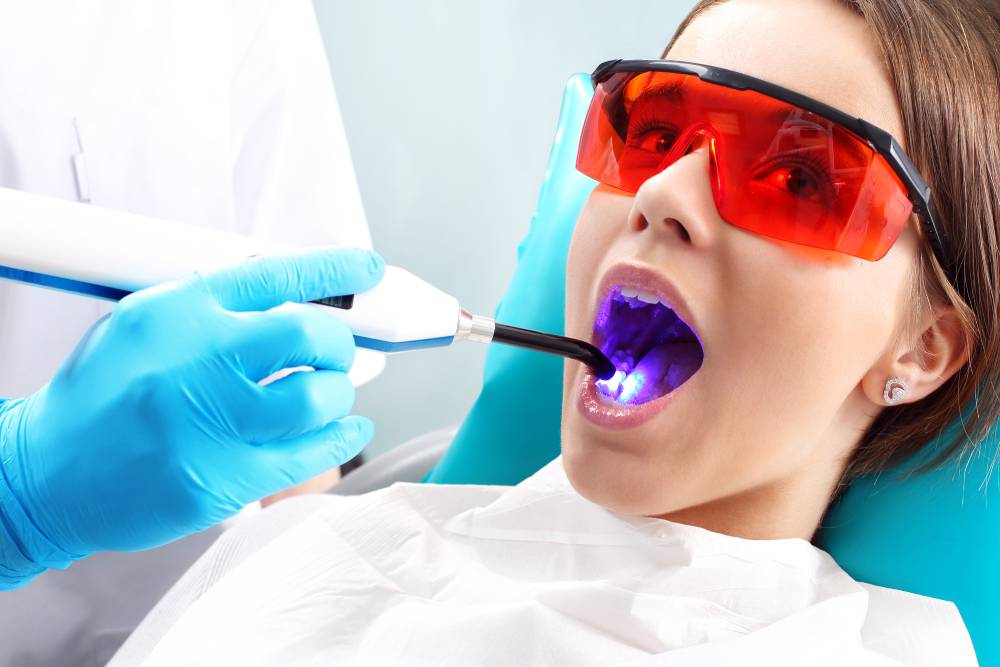Laser dentistry
Laser dentistry London

If laser dentistry is a new word for you, you are missing out on a lot of things. This latest innovation in the field of dentistry allows completing lengthy dental procedures in much less time and with minuscule discomfort to the patient. Visit us at our London and MT Brydges Ontario laser dental treatment centers for soft tissue related problems such as excessive visibility of gums while smiling, tongue-tie, removal of soft tissue from over the wisdom teeth, etc.
Kindest way to deal with gum therapy and soft tissue surgeries.
Laser Dentistry Services Offered
- Operculectomy i.e. removal of gum tissue from over the wisdom tooth
- Frenectomy (removal of excessive muscle tissue and tongue tie)
- Tissue biopsy
- Crown lengthening
- Gum reshaping for a better smile line when you have a ‘gummy smile’
- Treatment of tooth sensitivity

Laser Dentistry FAQ
Lasers are incredibly concentrated energy beams of light, and the dental procedures that require the use of lasers come under laser dentistry.
Hard tissue lasers- are predominantly used for the hard tissues of your tooth and generally used in the procedures of cavity preparation and treating tooth sensitivity.
Soft tissue lasers- used in the procedures of gum surgery, crown lengthening, and tongue-tie removal when they have to deal with soft tissues.
Lasers are beneficial in many ways, some of them being as follows:-
-Anesthesia application may not be required
-Tissue bleeding is minimal as compared to traditional surgical procedures which not only is more relaxing for people who get nervous on the site of blood but is also helpful to the surgeon since less bleeding means better visibility of the surgical site.
-Lasers simultaneously sterilize the surgical site because of the enormous amount of energy, thus minimizing both, postoperative discomfort and, chances of infection.
-Less infection means rapid healing of the wound.
Recently, lasers are not only used for detecting cavities and cracks in the tooth or preparing the tooth cavity for a filling but also performing root canal treatments. The high energy of lasers enables it to cut the hard tissues and virtually burn the infected soft tissues leaving no room for re-infection.
Sometimes, the wisdom tooth doesn’t erupt fully in the oral cavity and remains partially covered by the soft tissue flap, which seems to be an extension of your gums. This flap is called an operculum. If the flap is loose enough, the food particles do not accumulate there, but if this flap has restricted movement, food particles get lodged between the tooth surface and the flap. This causes decay of the tooth and simultaneous inflammation of the flap. It requires the surgical removal of the flap, and the procedure is termedoperculectomy. Now, lasers very conveniently detach the flap and uncover the underlying tooth thereby nullifying the chances of food lodgment and subsequent infection and that too with minimal bleeding and discomfort.
Crown lengthening procedure is done to increase the height of a prepared tooth for receiving durable restorations such as a crown. For this, the gums are operated upon, and more significant part of the tooth is exposed. It is a kind of gum surgery where lasers are used.
Tooth sensitivity is primarily caused by opening up of dentinal tubules, which are more sensitive than the hard enamel that you see as the white of your teeth. Lasers seal these tubules, thus cutting them off from the external sensations and treating sensitivity.
Tongue tie is a congenital disability which manifests itself as a thin membrane that lies between the lower part of the tongue and the floor of the mouth. This membrane prevents free movement of the tongue and interferes with speech. Lasers are used to remove this soft tissue membrane and promote free tongue movement.
Different procedures require different types of intervention, and thus, the cost factor also varies accordingly.




